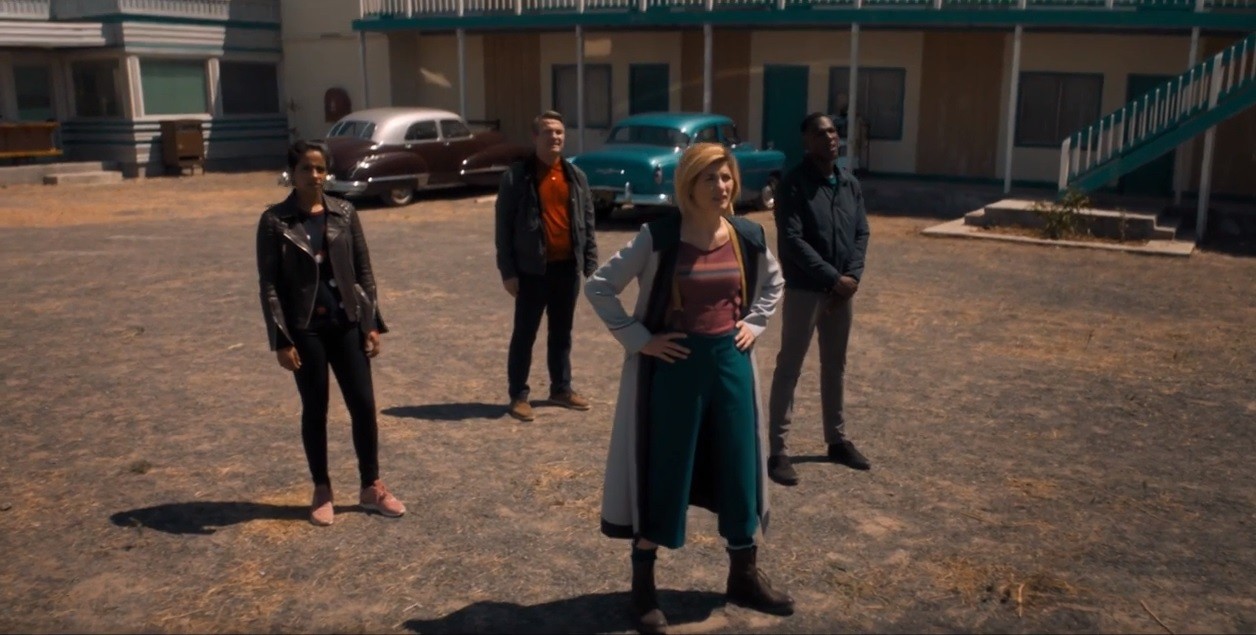San Diego Comic Con heralded a lot of tantalizing looks at Series 11 of Doctor Who and our new Doctor, Jodie Whittaker. In addition to the revamped sonic screwdriver, the trailers appear to confirm that we will have three full-time companions for the series, Mandip Gillas Yaz, Tosin Cole as Ryan and Bradley Walsh as Graham. This will be the first time a crew of that size has been assembled for more than a couple of episodes since the Peter Davison era.
The move has left some fans scratching their heads worried. Since the series was revived in 2005 there has generally been only a single main companion at a time, with only Rory (Arthur Darvill) and Nardole (Matt Lucas) truly settling in as companions for more than three episodes at a time. That’s a trend that goes all the way back, again, to Davison’s tenure, when his four-person crew was reduced to two. That trend continued more or less unbroken until with present day, save C’Rizz (Conrad Westmass) joining the Eighth Doctor (Paul McGann) and Charley (India Fisher) in audio adventures.
Why three companions? Does the BBC feel the first female Doctor can’t pull off the show on her own and so has a bigger crew to pick up the slack? Not according to new showrunner Chris Chibnall. In an interview with Digital Spy he claimed that the goal was simply a more ensemble show.
“I love Doctor Who as a big, popular, mainstream, accessible show,” says Chibnall. “So I wanted to make sure that every member of the audience felt they had a relatable character, an access point. Hopefully it means that the show can resonate with the broadest possible audience.”
No doubt statements like that will bring out the hordes who feel that the show is bowing down to the demands of diversity in casting, but I’m personally hopeful.
Doctor Who started out with a big Tardis crew, and such crews were the norm well into the Pertwee era (if you consider UNIT staff as a whole to be companions). The multiple points of view that Chibnall is discussing worked perfectly as the show was getting off the ground. The crew that launched the series in “An Unearthly Child” truly had something for everyone. It was the kind of show that would still be a potent mix with something like Buffy the Vampire Slayer decades later; a strong heroic lead surrounded by a colorful cast of characters.
My personal favorite Tardis crew comes from Season 4, which had the Second Doctor (Patrick Troughton) travel with Ben (Michael Craze), Polly (Anneke Wills) and Jamie (Frazer Hines). They were an almost perfect match. Jamie was the man naïve audience cipher, Ben the cynic who created tension, Polly the reconciler and of course, The Doctor. The full weight of the audience’s point of view wasn’t carried by any single companion, allowing for more growth and range.
Compare it to, say, Series 8 and 9 and Clara Oswald (Jenna Coleman). By then she was one of the longest serving companions in the show’s history, and had generally done so all alone. She’d come out of the Impossible Girl storyline, the massive 50th Anniversary special and the death of Eleven (Matt Smith). By the time her character left the show, she was like butter spread over too much bread. Everything that wasn’t The Doctor was hanging on her, and it made her character scattered and without focus. A second or even third companion would have helped that burden.
There is some danger. The main reason that the Tardis crews shrank in the first place was that finding things for them all to do was hard on the writers, and that was back when an adventures was usually four 30-minute serials instead of 45-minute episodes.
Then again, if Buffy could pull it off, I don’t see why Doctor Who would be any different. On the rare occasions when there were larger crews, such as “School Reunion” or “Time of the Angels / Flesh and Stone” they were generally excellent, not the least because the show was dealing with various character that had established arcs.
Series 11 appears to be all about change, and the Tardis crew reflects that. I look forward to a larger one as a new experiment in the show. If the footage from the trailer is any indication, all parties involved appear up to the challenge.
Support Us
Houston's independent source of
local news and culture
account
- Welcome,
Insider - Login
- My Account
- My Newsletters
- Contribute
- Contact Us
Doctor Who: In Defense of Three Companions

Screencap from the Series 11 trailer
[
{
"name": "Related Stories / Support Us Combo",
"component": "11591218",
"insertPoint": "4",
"requiredCountToDisplay": "4"
},{
"name": "Air - Billboard - Inline Content",
"component": "11591214",
"insertPoint": "2/3",
"requiredCountToDisplay": "7"
},{
"name": "R1 - Beta - Mobile Only",
"component": "12287027",
"insertPoint": "8",
"requiredCountToDisplay": "8"
},{
"name": "Air - MediumRectangle - Inline Content - Mobile Display Size 2",
"component": "11591215",
"insertPoint": "12",
"requiredCountToDisplay": "12"
},{
"name": "Air - MediumRectangle - Inline Content - Mobile Display Size 2",
"component": "11591215",
"insertPoint": "4th",
"startingPoint": "16",
"requiredCountToDisplay": "12"
}
,{
"name": "RevContent - In Article",
"component": "12527128",
"insertPoint": "3/5",
"requiredCountToDisplay": "5"
}
]

